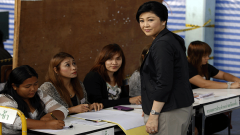Thailand went to the polls under heavy security on Sunday in an election that could push the divided country deeper into political turmoil and leave the winner paralysed for months by street protests, legal challenges and legislative limbo, reports Reuter News Agency.
The risk of bloodshed at the ballot remains high, a day after seven people were wounded by gunshots and explosions during a standoff between supporters and opponents of embattled Prime Minister Yingluck Shinawatra in a north Bangkok stronghold of her Puea Thai Party.
Voting was called off in the district for fear of possible further violence, the Election Commission said.
Sanguan Charladkitsirikul, a 54-year-old account manager, rode his bicycle to vote under a canopy in a carpark near the main port in Bangkok where just two policemen were on guard.
“Thai people can’t let others order us around. With the political situation as it is, the Thai people should come out to vote,” he said.
The usual campaign billboards, glossy posters and pre-election buzz have been notably absent, as will be millions of voters fearful of poll violence or bent on rejecting a ballot bound to re-elect the political juggernaut controlled by Yingluck’s billionaire brother, Thaksin Shinawatra.
Thaksin, 64, is loved and loathed in Thailand, but his parties have won every poll since 2001. His opponents say he is a corrupt crony capitalist who rules by proxy from self-exile in Dubai.
Victory celebrations would be likely muted for Yingluck. With parliamentary seats unable to be filled and the prospect of violence disrupting voting, she could find herself on shaky ground, exposed to legal attacks and unable to pass bills and budgets crucial to reviving a stuttering economy.
Yingluck last week refused to postpone the election, even though a fifth of those registered for advanced voting were unable to cast ballots after protesters blocked polling stations in 49 of 50 Bangkok districts as part of a “shutdown” of key intersections in the city. In 28 southern constituencies, no votes will be cast because no candidates could sign up.
Some 130,000 security forces were to be deployed across the country, 12,000 in Bangkok, National Security Council chief Paradorn Pattantabutr told Reuters.
“We’re confident there won’t be too much chaos,” he said.
Polling stations opened at 8am and the Election Commission says results will not be available on the day. Its commissioners are worried about unrest and are braced for a deluge of complaints and challenges to the results.
“There’s been a lot of obstruction, so much, every single step of the way,” commission secretary-general Puchong Nutrawong told Reuters.
“We don’t want this election to be a bloody election. We can get every single agency involved to make this election happen, but if there’s bloodshed, what’s the point?”
Elections, protests and military or judicial interventions that have polarised the country and angered Thaksin’s “red shirt” supporters, who held crippling blockades in 2010 and have vowed to defend his sister from any overthrow attempt.
Thailand’s military has remained neutral so far, but the judiciary has taken on an unusually large number of cases in the past two months in response to complaints against Yingluck and Puea Thai that could result in the party’s dissolution and lengthy bans for its top politicians.
There is also a chance the election could be annulled, as it was in 2006, over a technicality. The Election Commission is expecting lawsuits to be filed demanding the election be voided.
The main opposition Democrat Party is boycotting the poll and the commission has already voiced concerns that it would result in too few legitimately elected MPs to form a parliamentary quorum.
With no quorum to re-elect a prime minister, it looks likely Yingluck could be a caretaker premier for months. Even with a fresh mandate, a stalemate is almost certain, giving her opponents more time to intensify their campaign against her and for legal challenges to be lodged.
“Yingluck will look weaker and weaker, heading a caretaker government with decreasing authority to govern, more vulnerable to the charges against her as the Bangkok blockades become unbearable,” said Thitinan Pongsudhirak, an expert on Thai politics at Bangkok’s Chulalongkorn University.
Source: Dhaka Tribune









